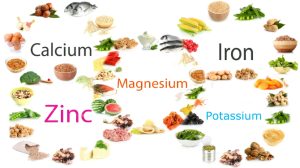
Minerals are essential nutrients that our bodies need to function properly
However, many people may not consume enough of these nutrients, leading to mineral deficiencies that can have negative health effects. In this article, we will discuss common mineral deficiencies and their associated health risks, as well as strategies to address these deficiencies
Iron Deficiency
Iron deficiency is one of the most common mineral deficiencies worldwide, particularly in women of reproductive age. This deficiency can lead to anemia, which can cause fatigue, weakness, and difficulty concentrating. To address iron deficiency, individuals can consume iron-rich foods such as red meat, poultry, fish, beans, and leafy greens. Iron supplements may also be recommended by a healthcare professional.
Calcium Deficiency
Calcium deficiency is another common mineral deficiency that can lead to osteoporosis, a condition where bones become weak and brittle. This deficiency can also increase the risk of fractures and tooth decay. To address calcium deficiency, individuals can consume calcium-rich foods such as dairy products, leafy greens, and fortified foods. Calcium supplements may also be recommended, particularly for individuals who are lactose intolerant or have difficulty consuming enough calcium through their diet.
Magnesium Deficiency
Magnesium deficiency is associated with several health issues, including muscle cramps, anxiety, and high blood pressure. This deficiency is more common in individuals with gastrointestinal disorders, such as Crohn’s disease or celiac disease. To address magnesium deficiency, individuals can consume magnesium-rich foods such as whole grains, nuts, seeds, and leafy greens. Magnesium supplements may also be recommended by a healthcare professional.
Zinc Deficiency
Zinc deficiency can lead to impaired immune function, delayed wound healing, and loss of appetite. This deficiency is more common in individuals with gastrointestinal disorders, such as ulcerative colitis or Crohn’s disease. To address zinc deficiency, individuals can consume zinc-rich foods such as red meat, poultry, seafood, and beans. Zinc supplements may also be recommended by a healthcare professional.
Sodium Deficiency
While sodium deficiency is rare, it can lead to muscle cramps, nausea, and dizziness. This deficiency is more common in individuals who consume a low-sodium diet or who engage in intense physical activity. To address sodium deficiency, individuals can consume sodium-rich foods such as table salt, processed foods, and snacks. However, it is important to consume sodium in moderation, as too much sodium can lead to high blood pressure and other health issues.
In conclusion, mineral deficiencies can have negative health effects, but they can be addressed through dietary changes and supplements. It is important to talk to a healthcare professional before starting any supplement regimen to ensure that the recommended daily intake is met without exceeding it. By consuming a variety of nutrient-rich foods, individuals can ensure that their bodies receive the essential minerals they need to function properly.


